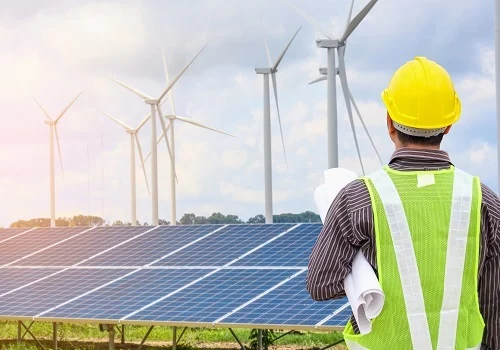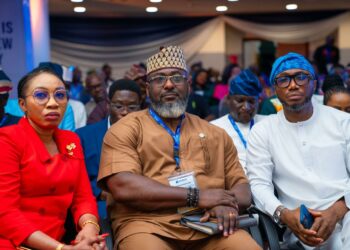The Economic Community of West African States (ECOWAS) Sustainable Energy Forum (ESEF) the premier energy event in West Africa has premised its drive for sustainable energy on technology to address the energy needs of the region.
The 7th Edition of the Forum (ESEF2022) organised by the ECOWAS Centre for Renewable Energy and Energy Efficiency (ECREEE) in collaboration with Nigeria’s Ministry of Power, was held in Abuja on Monday.
ECREEE is a specialised agency of the ECOWAS with a public mandate to promote sustainable energy markets in the ECOWAS region.
Leaders of the region were focused on maximising the potential of the region to drive industrialisation as they pledged their commitment to enhance the availability of electricity in the region by boosting power generation through technology.
Nigeria’s vice president, Professor Yemi Osinbajo who declared the summit open, said Nigeria’s Energy Transition Plan (ETP) would require funding of about 1.9 trillion dollars up to 2060.
Represented by the minister of power, Mr Abubakar Aliyu, the vice president explained that 410 billion dollars of this amount was above usual spending and implies that Nigeria needs to mobilise an additional 10 billion dollars per annum.
‘’The realisation of this goal depends on the implementation of our nation’s Energy Transition Plan (ETP) which was recently launched by this administration.
‘’Nigeria’s Energy Transition Plan is a prime example of the needed evolution of policies to deliver both the growth in energy consumption necessary for development and the climate response required for the preservation of our planet.
‘’Our Energy Transition Plan seeks to tackle the dual crises of energy poverty and climate change, and deliver universal energy access (SDG7) by 2030 and net-zero by 2060.
‘’It is also a bolder articulation of our commitment to sustainability and renewables as earlier proposed in the Electricity Vision 30:30:30, which aims to provide 30GW of electricity by the year 2030 with renewable energy contributing at least 30 per cent to the energy mix,” he said.
He added that the success of universal energy access and carbon neutrality is dependent on effectiveness in crowding in these investments, stressing that the Nigeria government plans to roll out a set of policy measures that would attract financing and investments of up to 10 billion dollars and create scalability of programmes of over 30 billion dollars over the coming decades.
‘’For instance, we are updating the Mini-Grid Regulation to raise cap for licensing from 1 megawatt (MW) to 5 megawatts (MW); developing the policy for integration of Utility Scale Solar into the Grid,
‘’With a requirement for 10 per cent of on-grid power to come from Solar by 2025 creating a Solar Stabilization Fund with a target of 100 million dollars to backstop on-grid solar contracts.
“We are completing scalable, private sector-driven Renewable Energy Distribution Franchise pilots (all at Financial Close) including: Konexca Distribution model USD90 million with the Kaduna Distribution Company (DISCo).
“And we want to stabilise the on-grid sector through modernising operations of our Grid and further preparing the grid for renewable energy,” he said.
The government has started incorporating Solar PV Alternative Power Supply to select Public Buildings; and developing the 3D (Distributed, Decarbonised, and Digitalised) 24 Hours Feeder Programme.
This project is geared towards providing uninterrupted power supply to dedicated feeders through a hybrid of grid and renewable power.
“These efforts amplify our commitments and signify our readiness for investments.
“We must work together on strategies and reforms needed to crowd in the investments required for real and impactful projects and progress on the ground.
“To reach our goals, sufficient capital must be made available in the region, and we must do our part in creating the enabling environment for these funds.
“As a region, we must scale such efforts and deliver robust and sustainable energy systems for the prosperity of our people.
“Private sector participation and technological applications for clean and sustainable energy is the future for the ECOWAS region,” he said.
On his part the president of ECOWAS Commission, Dr. Omar Touray, said improved electricity will advance the region’s industrialisation process.
Dr. Touray, who was represented by the ECOWAS Commissioner for Infrastructure, Energy and Digitalisation, Sediko Douka, said 50 per cent of Africans have access to electricity, but less than 10 per cent are accessible to those in the rural areas.
He disclosed that ECOWAS is working hard to integrate all communities into the grid, saying “by next year we will have an electricity market where contractors can buy electricity.” He further added that “We are developing a new energy policy for the region that will be operational by June next year.”
According to him, “The ECOWAS Commission and its specialised energy agencies are working tirelessly to address these challenges. Our strategic objective is to integrate the operation of the Community’s national power grids into a unified regional electricity market to ensure a stable, regular, and reliable supply of competitively priced electricity to the citizens of the ECOWAS member States in the medium term.
“We plan to achieve this objective by promoting and developing power generation and transmission facilities and equipment and coordinating electricity trade among the ECOWAS Member States.
“It is the reason that we launched the regional electricity market since June 2018 and the ECOWAS Statutory Bodies adopted a Master Plan for the development of regional power generation and transmission infrastructure 2019-2033 aiming to generate 16000 MW and construct 23000 km interconnection electric lines,” he said.
He revealed that: “The ECOWAS Commission is also working on improving energy access for the ECOWAS rural population and actively promoting the deployment of off-grid energy solutions, such as clean energy mini-grids and stand-alone technologies.
“To this end, several regional projects are at the stage of implementation within the region. Our objective is to have an access consolidated rate of 70% by 2030.”
“The ECOWAS Renewable Energy Policy aims to increase the share of renewable energy in the region’s overall electricity mix to 48% in 2030; and the ECOWAS Energy Efficiency Policy, aims to implement measures that free 2000 MW of power generation capacity and in the medium term, more than double the annual improvement in energy efficiency.”
“By next year we will have an electricity market where contractors can buy electricity.” He added that: “We are developing a new energy policy for the region that will be operational by June next year,” he said.
Much as the regional leaders roll out their strategies to boost power supply, there are serious constraints of funding and sometimes the legal framework on how some of these policies would work on a regional basis.





